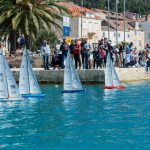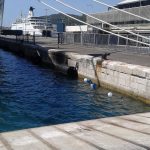June 12, 2018 — Croatia’s vaunted Adriatic Sea may soon join the ranks of the world’s oceans — a plastic-filled, hot mess — if things don’t change soon.
Croatia’s chunk of the Adriatic Sea is quickly filling with plastic, according to a new report by the World Wildlife Foundation, which claims too little of the country’s plastic products are recycled. The report piggybacks on new evidence the sea is warming at an unusual rate — a welcome change for beachgoers yet problematic for the marine ecosystem.
The nonprofit environmental group said less than half of the 54,744 tonnes of plastic Croatians used in 2016 was recycled.
The group hopes legislation such as the Marine and Coastal Management Strategy can improve Croatia’s waste management strategies; the country hopes to have a fully-fledged marine waste management system by 2022.
The situation isn’t dire yet and can be reversed, Mosor Prvan of WWF Adria told BIRN in an interview during a visit to Lastovo, an island off the southern edge of Dalmatia.
“Plastic waste is not yesterday’s problem. It’s a long lasting, as well as a multi-layered problem,” he told BIRN.
The report was released just as Ocean-Lab (CMCC), showed the Adriatic’s become unusually hot, sometimes reaching more than three degrees above the average temperature for this time of year.
The Adriatic’s temperature jumps coincide with the general warming of the world’s oceans, except in an exaggerated fashion, Dr. Branka Grbec told Jutarnji List, claiming there isn’t some pattern of oscillation between warm and cold waters. Temperatures simply keep rising.
“The extreme situations are becoming more frequent, stronger and longer-lasting,” she told the paper, adding the biological makeup of the sea is changing as a result.
The WWF’s report, “Out of the Plastic Trap”, focuses on the Mediterranean overall, where plastic accounts for 95 percent of the sea’s waste.
Europe is the second-largest plastic polluter in the world after China, dumping anywhere between 150,000 to half a million tonnes of plastics into the Mediterranean Sea every year.
The number increases by as much as 130,000 annually when including microplastics, a particularly deadly variant which is ingested by marine animals, often suffocating them.
These numbers jump during the tourism season — which includes Croatia’s mythical summer flood of visitors. During “the season,” marine litter increases across the continent by up to 40 percent.









